
History

 |
Newfoundland History |
 |
Claude Bélanger,
Radstock, William Waldegrave, first Baron (1753-1825), admiral, wasgovernor of Newfoundland from 1797 to 1800. See Dic. nat. biog. [website]
Robinson, John Alexander (1862-1929), publisher, was born on June 29, 1862, in [Scotland]. He was principal of the grammar school at Carbonear, Newfoundland, from 1883 to 1892, [a founder of the Newfoundland Teachers' Association]; [he sat briefly in the Newfoundland House of Assembly in 1897 although he soon resigned his seat to be appointed to the Legislative Council. He ran again for election in the next decade but was mostly unsuccessful. He served again on the Legislative Council from 1909 to 1919. He was appointed] colonial secretary for Newfoundland (1897-1900), postmaster-general (1916-20), and [again was made a] member of the Legislative Council [in 1926]. He was publisher of Newfoundland Daily News and Free Press. He died in April, 1929. In 1883 he married Flora, daughter of Joseph Hayward Taylor of Carbonear.[Robinson on the end of the First World War]
[Roche, Edward Patrick (1874-1950). Placentia born Roman Catholic archbishop of St. John's (1915-1950), he was very active in the propagation of Catholic causes and views. He became a fierce opponent to Confederation, fearing for Newfoundland's denominational school system. A newspaper under his influence wrote that, with Confederation, Newfoundlanders should prepare themselves to "become a nation of shopkeepers, bartering autonomy and self-competence for a political and economic mirage".] [Biography at the Newfoundland Heritage site] [Archbishop Roche and Confederation] [The Catholic Church in Newfoundland and World War One]
Rodney, George Brydges, first Baron (1718-92), admiral, governor of Newfoundland (1748-50), was born on February 19, 1718. He went to sea in 1724, served on several stations, and from 1748 to 1750 was governor and commander-in-chief of Newfoundland. He was a stern administrator, but was sympathetic towards the fishermen, and his name is immortalized in the name of a type of small boat. He had a brilliant naval career, and his crowning achievement was the defeat of -the French off Dominica in 1782. See G. B. Mundy, The life and correspondence of the late Admiral Lord Rodney (2 v., London, 1830). [website]
[Rowe, Frederick William(1912- ).Born in Lewisporte, he studied at Memorial and Mount Allison universities as well as at the University of Toronto. Upon graduation, he began to teach. After 1949, he became the first deputy minister of Public Welfare in Newfoundland. He was elected to the Newfoundland House of Assembly in 1951 and sat as a member for the next twenty years. He served as a minister in various positions, notably in education and finance, in the Smallwood governments. Rowe suffered personal defeat in the provincial elections of 1971. He was appointed to the Senate by the Trudeau government and remained there until his retirement in 1987.William Rowe also wrote a number of books about Newfoundland that are widely read. Among them are: History of Education in Newfoundland, Extinction and a History of Newfoundland and Labrador. ] [Biography at the Canadian Orangeism site] [Short biography]
[Ruggles, Charles Frederick (1923-1996).Newfoundland photographer, inventor and businessman. (Archival treasures of Memorial University)]
[Russell, Dora (Oake) (1912-1986). Teacher, editor, columnist and writer. (Archival treasures of Memorial University)]
[Russell, Ted (1904-1977). Teacher, politician and writer. Creator of Uncle Mose. (Archival treasures of Memorial University)]
St.
John's,capital city of Newfoundland, educational
and commercial centre of the island, is situated on the east coast near one
of the northerly points of the Avalon
peninsula, 547 miles by rail from Port
aux Basques. St.
John's was well established as a fishing station when Sir Humphrey
Gilbert arrived in 1583 to take possession of the island for the British
crown. The harbour is an excellent one, and its strategic location has made
St. John's a shipping centre of importance. The approach to the harbour, known
as the Narrows,
is flanked on either side by cliffs 500 feet high. Historically, St. John's
is of considerable interest. During the seventeenth and eighteenth centuries,
when the English
and French were struggling for supremacy, the city was twice destroyed
before the final expulsion of the French in 1762. It was from Cabot
Tower on Signal 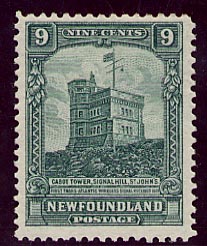 Hill,
on the north side of the Narrows, that Marconi
received the first trans-Atlantic wireless message, on December 12, 1901.
St.
John's claims the distinction of being the starting point of the first
non-stop flight across the Atlantic, made by Alcock
and Brown, in 1919. During World
War II, the strategic position of St. John's made it important to the
allies, and consequent wartime activities had a great effect on the growth
of the city. Wartime additions were: to the east, the American army base at
Fort Pepperrell;
on the waterfront, the Canadian government piers and administrative buildings;
and to the north-west, rapid expansion of the residential district. Notable
buildings are the Roman
Catholic cathedral, situated on a hill, and visible from any approach
to the city; the Church
of England cathedral, a fine example of Gothic architecture; Government
House, a replica of Admiralty House in Plymouth, England; the Newfoundland
Hotel, a modern building completed in 1926; and Memorial
University College, erected in 1924. The city and outlying districts are
served by buses and there are good motor roads to various parts of the peninsula.
Daily newspapers are the Daily
Newsand the Evening
Telegram. Pop.57,496. For further information see P. K. Devine,
Ye olde St. John's, 1750-1936, (St. John's, 1936); E. B. Foran, St.
John's city, and M. F. Harrington, on, Flaming history in J. R.
Smallwood (ed.), Book of Newfoundland (St. John's, 1937); D. E. Lewis,
St. John's (Dalhousie Rev., 1945); T. Meaney, St. John's (Atlantic
Guardian, Feb. 1945). [Pictures
of St. John's] Extensive collection of historical
photos of St. John's] [St.
John's Walking Tour] [St. John's
website] [History
of St. John's]
Hill,
on the north side of the Narrows, that Marconi
received the first trans-Atlantic wireless message, on December 12, 1901.
St.
John's claims the distinction of being the starting point of the first
non-stop flight across the Atlantic, made by Alcock
and Brown, in 1919. During World
War II, the strategic position of St. John's made it important to the
allies, and consequent wartime activities had a great effect on the growth
of the city. Wartime additions were: to the east, the American army base at
Fort Pepperrell;
on the waterfront, the Canadian government piers and administrative buildings;
and to the north-west, rapid expansion of the residential district. Notable
buildings are the Roman
Catholic cathedral, situated on a hill, and visible from any approach
to the city; the Church
of England cathedral, a fine example of Gothic architecture; Government
House, a replica of Admiralty House in Plymouth, England; the Newfoundland
Hotel, a modern building completed in 1926; and Memorial
University College, erected in 1924. The city and outlying districts are
served by buses and there are good motor roads to various parts of the peninsula.
Daily newspapers are the Daily
Newsand the Evening
Telegram. Pop.57,496. For further information see P. K. Devine,
Ye olde St. John's, 1750-1936, (St. John's, 1936); E. B. Foran, St.
John's city, and M. F. Harrington, on, Flaming history in J. R.
Smallwood (ed.), Book of Newfoundland (St. John's, 1937); D. E. Lewis,
St. John's (Dalhousie Rev., 1945); T. Meaney, St. John's (Atlantic
Guardian, Feb. 1945). [Pictures
of St. John's] Extensive collection of historical
photos of St. John's] [St.
John's Walking Tour] [St. John's
website] [History
of St. John's]
[Scallan, Thomas (1766-1830). A native of Wexford, arrived in Newfoundland in 1812. Was appointed Roman Catholic Vicar Apostolic of Newfoundland, 1816-1830.] [Archives Inventory Guide] [DCB]
Shanawdithit, Nancy (1800?-1829), last known member of the Beothuk tribe of Newfoundland. She and her mother and sister were captured at Badger bay in the spring of 1823. The mother and sister soon died, but Nancy lived for five years in the home of John Peyton at Exploits. In 1828 she was moved to St. John's and lived for a time in the home of William Epps Cormack, president of the Beothuk Institute. Through her drawings and the English she had learned, she was able to supply much information concerning her tribe. She died on June 6, 1829. See J. P. Howley, The Beothucks or Red Indians (Cambridge, 1915). [Can. Ency] [Bishop Inglis' Interview with Shanawdithit, 1827] [Beothuk History and Religion] [DCB] [Beothuk at the Canadian Encyclopedia] [William Epps Cormack at the Canadian Biographical Dictionary]
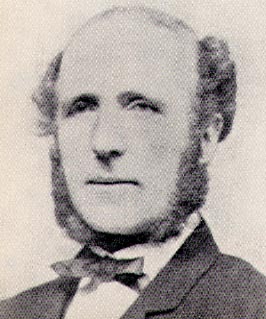 Shea,
Sir Ambrose (1815-1905),
merchant and statesman, was born at St.
John's, Newfoundland, on September 17, 1815, the son of Henry
Shea. He was educated in St. John's, and entered his father's business.
He entered the assembly in 1848, as a member for Placentia,
and was active in Newfoundland politics for many years. In 1855 he became
speaker of the House, and in 1864 was one of the two Newfoundland delegates
to the conference
at Quebec. From 1865 to 1869 he was colonial secretary. He was created
a K.C.M.G. in 1883, and in 1886 was nominated governor of Newfoundland but
was prevented by public sentiment from accepting the post. From 1887 to 1894
he was governor of the Bahamas and he died in London, England, on July 3,
1905. He was married twice, (1) in 1851 to Isabella Nixon of Edinburgh (d.
1877); and (2) to Louise, daughter of Joseph
Bouchette, surveyor-general for Canada. See W. H. Hayward, Sir Ambrose
Shea, K.C.M.G. (Atlantic Guardian, 1949). [DCB]
[biography at the
National Library site] [picture]
[Pro-Confederation speech]
[biography at the
Catholic Encyclopedia] [His nephew George
Shea] [The rejection
of Confederation in the period of 1865 to 1874]
Shea,
Sir Ambrose (1815-1905),
merchant and statesman, was born at St.
John's, Newfoundland, on September 17, 1815, the son of Henry
Shea. He was educated in St. John's, and entered his father's business.
He entered the assembly in 1848, as a member for Placentia,
and was active in Newfoundland politics for many years. In 1855 he became
speaker of the House, and in 1864 was one of the two Newfoundland delegates
to the conference
at Quebec. From 1865 to 1869 he was colonial secretary. He was created
a K.C.M.G. in 1883, and in 1886 was nominated governor of Newfoundland but
was prevented by public sentiment from accepting the post. From 1887 to 1894
he was governor of the Bahamas and he died in London, England, on July 3,
1905. He was married twice, (1) in 1851 to Isabella Nixon of Edinburgh (d.
1877); and (2) to Louise, daughter of Joseph
Bouchette, surveyor-general for Canada. See W. H. Hayward, Sir Ambrose
Shea, K.C.M.G. (Atlantic Guardian, 1949). [DCB]
[biography at the
National Library site] [picture]
[Pro-Confederation speech]
[biography at the
Catholic Encyclopedia] [His nephew George
Shea] [The rejection
of Confederation in the period of 1865 to 1874]
Shea, Sir Edward Dalton (1820-1913), publisher and politician, was born in [St. John's] Newfoundland in 1820, youngest son of Henry Shea. He entered his father's business at the age of sixteen, but later turned to journalism and, [along with his brother], became editor of The Newfoundlander. In the first parliament under responsible government (1855) he [was elected to the House of Assembly] as a [Liberal] member for Ferryland. [While in the Assembly, Shea opposed Hoyles' attempt to create a coalition government with Roman Catholics.] He was appointed to the Legislative Council in 1865, [under the F. B. T. Carter administration] [supported Confederation, contrary to most other Roman Catholics] retired in 1869 to contest an election [in which he was defeated], but was appointed again in 1873 and was colonial secretary [in the Carter and Whiteway governments] until 1885, when he became president of the council. In 1912 he resigned the presidency, but retained his seat in the upper house until he died on January 8, 1913, at the age of ninety-three. In 1903 he was created a knight bachelor. He married Gertrude Corbett (d. 1903), and by her had one son and five daughters. [Biography] [DCB]
Shuldham, Molyneux, Baron (1717?-1798), admiral, was governor of Newfoundland (1772-75) and commander-in-chief on the North American coast (1775-76). [website] [DCB]
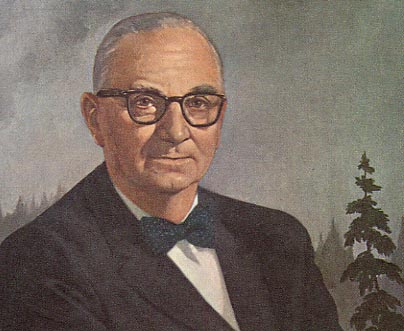 [Smallwood, Joseph (Joey) R. (1900-1991). Born
in Gambo
(Smallwood was nicknamed "the "little fellow from Gambo"), Smallwood became
a journalist, a politician, an editor - he was the editor of the Book of
Newfoundland, 6 vols. (1937-1975) and of the Encyclopedia of Newfoundland
and Labrador, 5 vols. (1981-1994) -, a union organizer, a broadcaster
("The Barrelman") and remained always an insatiable promoter of all things
connected to Newfoundland. An eloquent, able, ambitious and charismatic individual,
he rose rapidly to prominence at the National
Convention. He championed union with Canada as a way to insure a decent
standard of living for average Newfoundlanders. He was a member of the delegation
sent to negotiate the terms of union of Newfoundland with Canada. His
role at the time of the Newfoundland referenda and in the post 1949 period
earned him the title of "the only living Father of Confederation". Smallwood was the Premier of Newfoundland for the next
twenty-three years after the province joined Canada. His term of office corresponded
largely with the post war Liberal era when the federal government was very
active in creating and supporting a range of initiatives whose purpose it
was to reduce inequalities between individuals and regions of the country.
Such policies were highly beneficial to Newfoundland. Consequently, it was
not difficult for Smallwood to show the tangible results of union with Canada
and he rarely lost an occasion to point these out. He had less success in
pursuing his objective of economic diversification, especially industrialization
of the province, and with the continuation of the payments made under Term
29 of the Act
of Union of Newfoundland with Canada, which came to an end in 1962, despite
his strong objections. His premiership came to an end in 1972 as a result
of major defections within the Newfoundland Liberal Party and the Smallwood
cabinet, challenges to his leadership, accusations of authoritarianism and
a revival of the Conservative Party under Frank
Moores. He devoted much of the period of 1972-1977 to attempts at a political
comeback as leader of the Liberal Reform Party. In the 1980's, he spent a
good deal of time editing The Encyclopedia
of Newfoundland and Labrador. This monumental work eventually contained
five massive volumes, exemplifying significant scholarship, and stands as
a testament to Smallwood's love of his native province. The Encyclopedia
is the only one of its kind among the provinces of Canada. Smallwood went
personally into debt to support the project and completion was only achieved
thanks to the support of the Smallwood
Heritage Foundation. Of all he had achieved in his life, Smallwood was
most proud to have brought Newfoundland into Confederation, to have established
Memorial
University and to have edited the Encyclopedia of Newfoundland.
In many respects, Smallwood was a man of vision. Many Newfoundlanders remember
him fondly today. [Biography
at the Canadian Orangeism site] [Biography
at the Newfoundland Heritage site] [Can.
Ency] [1946 debate on Smallwood's
motion to inquire into the possibility of union with Canada] [Smallwood's
motion to send
delegations to London and Ottawa] [Smallwood's tabling of Report
of Ottawa delegation] [Motion
to put Confederation on ballot] [Joseph
Roberts Smallwood History page from Melvin Baker] [Biography
of Smallwood at the National Library site] [Biography
and description of Smallwood's papers at Memorial University] [History
of the Newfoundland National Convention] [Smallwood
on Term 29] [Melvin
Baker's analysis of the Smallwood era] [Rural
electrification through the 1950's] [Electrifying
Newfoundland] [On
term 29] [Newfoundland
provincial politics, the Smallwood years, 1949-1972]
[Smallwood, Joseph (Joey) R. (1900-1991). Born
in Gambo
(Smallwood was nicknamed "the "little fellow from Gambo"), Smallwood became
a journalist, a politician, an editor - he was the editor of the Book of
Newfoundland, 6 vols. (1937-1975) and of the Encyclopedia of Newfoundland
and Labrador, 5 vols. (1981-1994) -, a union organizer, a broadcaster
("The Barrelman") and remained always an insatiable promoter of all things
connected to Newfoundland. An eloquent, able, ambitious and charismatic individual,
he rose rapidly to prominence at the National
Convention. He championed union with Canada as a way to insure a decent
standard of living for average Newfoundlanders. He was a member of the delegation
sent to negotiate the terms of union of Newfoundland with Canada. His
role at the time of the Newfoundland referenda and in the post 1949 period
earned him the title of "the only living Father of Confederation". Smallwood was the Premier of Newfoundland for the next
twenty-three years after the province joined Canada. His term of office corresponded
largely with the post war Liberal era when the federal government was very
active in creating and supporting a range of initiatives whose purpose it
was to reduce inequalities between individuals and regions of the country.
Such policies were highly beneficial to Newfoundland. Consequently, it was
not difficult for Smallwood to show the tangible results of union with Canada
and he rarely lost an occasion to point these out. He had less success in
pursuing his objective of economic diversification, especially industrialization
of the province, and with the continuation of the payments made under Term
29 of the Act
of Union of Newfoundland with Canada, which came to an end in 1962, despite
his strong objections. His premiership came to an end in 1972 as a result
of major defections within the Newfoundland Liberal Party and the Smallwood
cabinet, challenges to his leadership, accusations of authoritarianism and
a revival of the Conservative Party under Frank
Moores. He devoted much of the period of 1972-1977 to attempts at a political
comeback as leader of the Liberal Reform Party. In the 1980's, he spent a
good deal of time editing The Encyclopedia
of Newfoundland and Labrador. This monumental work eventually contained
five massive volumes, exemplifying significant scholarship, and stands as
a testament to Smallwood's love of his native province. The Encyclopedia
is the only one of its kind among the provinces of Canada. Smallwood went
personally into debt to support the project and completion was only achieved
thanks to the support of the Smallwood
Heritage Foundation. Of all he had achieved in his life, Smallwood was
most proud to have brought Newfoundland into Confederation, to have established
Memorial
University and to have edited the Encyclopedia of Newfoundland.
In many respects, Smallwood was a man of vision. Many Newfoundlanders remember
him fondly today. [Biography
at the Canadian Orangeism site] [Biography
at the Newfoundland Heritage site] [Can.
Ency] [1946 debate on Smallwood's
motion to inquire into the possibility of union with Canada] [Smallwood's
motion to send
delegations to London and Ottawa] [Smallwood's tabling of Report
of Ottawa delegation] [Motion
to put Confederation on ballot] [Joseph
Roberts Smallwood History page from Melvin Baker] [Biography
of Smallwood at the National Library site] [Biography
and description of Smallwood's papers at Memorial University] [History
of the Newfoundland National Convention] [Smallwood
on Term 29] [Melvin
Baker's analysis of the Smallwood era] [Rural
electrification through the 1950's] [Electrifying
Newfoundland] [On
term 29] [Newfoundland
provincial politics, the Smallwood years, 1949-1972]
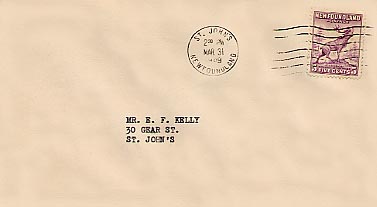
March 31, 1949; last day of official use of Newfoundland
stamps
to carry the mail throughout the island.
[Smith, Thomas (b. ?-1763). Naval governor of Newfoundland in 1741 and 1743. (Newfoundland Heritage site)]
[Sparkes, Grace (Patten) (1908-). Teacher, actor and political activist. (Archival treasures of Memorial University)]
Spencer, Aubrey George (1795-1872), first Anglican bishop of Newfoundland (1839-43), son of the Hon. William Spencer, was born in [London], England in 1795, brother to George Trevor Spencer, bishop of Madras. He attended school at Greenwich, and after serving for a time in the navy, entered Magdalen Hall, Oxford. While at Oxford, he won two prizes for poems. He entered the service of the church, served as a curate for one year, and then in 1819 sailed for Newfoundland as a missionary [for the Society for the Propagation of the Gospel in Foreign Parts]. Later, [in 1821], for the sake of his health, he removed to Bermuda, [which at the time was in the same diocese as Newfoundland], where in 1824 he was appointed archdeacon. In 1839, when Newfoundland and Bermuda were established as [separate] dioceses, he was appointed [first] bishop [of Newfoundland] and was consecrated in England, side by side with John Strachan, bishop-designate of Toronto. As bishop he visited Newfoundland and Labrador, and founded a small theological college [Queen's Theological College] for training missionaries for Newfoundland. On August 21, 1843, he laid the cornerstone of the cathedral in St. John's [St. John the Baptist]. [Plagued with poor health], in the same year he accepted the bishopric of Jamaica, and nine years later retired to England, where he died on February 24, 1872. He married Eliza, daughter of John Musson, in 1822, and was survived by three daughters. See C. H. Mockridge, The bishops of the Church of England ix Canada and Newfoundland (Toronto, 1896). [DCB] [Sermon on the Church of God] [Prospectus for erecting a Cathedral in St. John's]
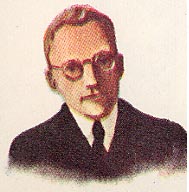 Squires, Sir Richard Anderson
(1880-1940), lawyer and statesman, was born at Harbour
Grace, Newfoundland, on January 18, 1880, the son of Alexander Squires
and Sidney Anderson. He was educated at Methodist College, St. John's, and
Dalhousie
University (LL.B.). He was admitted as a solicitor of the Supreme Court
of Newfoundland in 1902 [and joined the firm of Edward
P. Morris], and in 1911 was called to the bar. He was elected to the Newfoundland
House of Assembly for Trinity in 1909, was defeated in 1913 but in 1914 was
appointed to the Legislative Council and became Minister of Justice and Attorney-general.
[In 1916, he purchased the Daily
Star]. [In the all-parties national government of Morris] he became
colonial secretary in 1917, and in 1919 resigned to lead the Liberals in the
general election. His party was successful, and he became Prime Minister and
colonial secretary. After his program of industrial development in the interior
of the island had been upheld, in the general election of 1923, he retired
from the premiership but retained leadership of the Liberal party. [In his
first term of office, Squires had been quite active in his effort to diversify
the economy of Newfoundland and in attempting to resolve the financial woes
of Reid Newfoundland
in operating the transinsular railway, which the Squires government took
over financially in 1923. Some charged that Squires, along with other
members of the cabinet, had accepted payments against favours to various businesses.
An inquiry found that there was substance to the charges, although a grand
jury subsequently dismissed the case when it reached the courts. In 1925,
Squires was fined for income tax evasion.] He was Prime Minister again from
1928 to 1932, [a time when with the onset of the Great
Depression, in 1929, the financial problems of Newfoundland took a turn
for the worse. As discontent increased with the government's inability to
care properly for a growing number of people needing relief, Squires was accused
of falsifying records to cover-up improper payments made to him from the government
revenues. Despite Governor Middleton
who assured the public that no falsification of books had taken place - a
matter he had not in fact properly investigated - a rioting mob forced Squires
to call new elections. He was personally defeated and his party nearly written
off the map] and afterwards was made a master of the Supreme Court. [To a
large extent, the Amulree
report
blamed the financial problems of Newfoundland on the dishonesty of the Squires'
administration; there was evidently some truth to that, but some exaggeration
as well. The structural economic problems of Newfoundland also contributed
to the poor state of the provincial finances. The most important impact of
the Squires' scandals was to bring politicians into disrepute in Newfoundland
and to render the suspension of democratic rule under Commission
of Government more acceptable than otherwise it would have been. He was
created K.C.M.G. in 1921. He died on March 26, 1940. [In some of his writings,
Joey
Smallwood attempted to restore Squires' reputation.] In 1905 he married
Helena, daughter of James Strong of Little Bay Island, Newfoundland, and by
her had three sons and two daughters. [Squires'
administration and the loss of responsible government] [Newfoundland
in the 1920's] [Short
biography] [Can.
Ency] [Biography
at the Canadian Orangeism site] [Squires' biography at the Encyclopedia
of Newfoundland and Labrador] [Biography
of his wife] [picture]
Squires, Sir Richard Anderson
(1880-1940), lawyer and statesman, was born at Harbour
Grace, Newfoundland, on January 18, 1880, the son of Alexander Squires
and Sidney Anderson. He was educated at Methodist College, St. John's, and
Dalhousie
University (LL.B.). He was admitted as a solicitor of the Supreme Court
of Newfoundland in 1902 [and joined the firm of Edward
P. Morris], and in 1911 was called to the bar. He was elected to the Newfoundland
House of Assembly for Trinity in 1909, was defeated in 1913 but in 1914 was
appointed to the Legislative Council and became Minister of Justice and Attorney-general.
[In 1916, he purchased the Daily
Star]. [In the all-parties national government of Morris] he became
colonial secretary in 1917, and in 1919 resigned to lead the Liberals in the
general election. His party was successful, and he became Prime Minister and
colonial secretary. After his program of industrial development in the interior
of the island had been upheld, in the general election of 1923, he retired
from the premiership but retained leadership of the Liberal party. [In his
first term of office, Squires had been quite active in his effort to diversify
the economy of Newfoundland and in attempting to resolve the financial woes
of Reid Newfoundland
in operating the transinsular railway, which the Squires government took
over financially in 1923. Some charged that Squires, along with other
members of the cabinet, had accepted payments against favours to various businesses.
An inquiry found that there was substance to the charges, although a grand
jury subsequently dismissed the case when it reached the courts. In 1925,
Squires was fined for income tax evasion.] He was Prime Minister again from
1928 to 1932, [a time when with the onset of the Great
Depression, in 1929, the financial problems of Newfoundland took a turn
for the worse. As discontent increased with the government's inability to
care properly for a growing number of people needing relief, Squires was accused
of falsifying records to cover-up improper payments made to him from the government
revenues. Despite Governor Middleton
who assured the public that no falsification of books had taken place - a
matter he had not in fact properly investigated - a rioting mob forced Squires
to call new elections. He was personally defeated and his party nearly written
off the map] and afterwards was made a master of the Supreme Court. [To a
large extent, the Amulree
report
blamed the financial problems of Newfoundland on the dishonesty of the Squires'
administration; there was evidently some truth to that, but some exaggeration
as well. The structural economic problems of Newfoundland also contributed
to the poor state of the provincial finances. The most important impact of
the Squires' scandals was to bring politicians into disrepute in Newfoundland
and to render the suspension of democratic rule under Commission
of Government more acceptable than otherwise it would have been. He was
created K.C.M.G. in 1921. He died on March 26, 1940. [In some of his writings,
Joey
Smallwood attempted to restore Squires' reputation.] In 1905 he married
Helena, daughter of James Strong of Little Bay Island, Newfoundland, and by
her had three sons and two daughters. [Squires'
administration and the loss of responsible government] [Newfoundland
in the 1920's] [Short
biography] [Can.
Ency] [Biography
at the Canadian Orangeism site] [Squires' biography at the Encyclopedia
of Newfoundland and Labrador] [Biography
of his wife] [picture]
[Steele, Owen William (1887-1916).Member of the Newfoundland Regiment who died in action in the First World War. (Archival treasures of Memorial University)]
[Stirling, Georgina Ann (1844-1911). Newfoundland's first professional opera signer. (Archival treasures of Memorial University)]
[Subercase, Daniel d'Auger de (1660's-1732). Governor of Placentia/Plaisance between 1702 and 1706. (Newfoundland heritage site)] [DCB]
[Tait, Robert Holland (1891-1964). Veteran of the First World War, poet and historian. (Archival treasures of Memorial University)]
Talbot, Thomas [1818-1901], [born in Ireland] author and sheriff, was a teacher at the nondenominational academy in St. John's, Newfoundland, at its founding in 1844, later served for many years as sheriff, and from 1852 to 1869 was a member of the House of Assembly. [In the elections of 1869, he ran as an Anti-confederate and was appointed by Charles Bennett to the cabinet. In 1870 he was named to the Legislative Council; however, in 1872, he left both the government and the Council.] His publications include The Enchiridion of Epictetus, and the golden verses of Pythagoras, translated (Montreal, 1872); Hebrews at home (Montreal, 1874); The exile, and other verses (London, 1879); Greece and the Greeks (London, 1881); and a three-volume novel, The Granvilles, an Irish tale (London, 1882). [He also penned Newfoundland; or A Letter Addressed to a Friend in Ireland in Relation to the Condition and Circumstances of the Island of Newfoundland, With an Especial View to Emigration.]
[Tanfeild, Francis (1565-?), proprietary governor in Newfoundland in 1623-25, 1626. (Newfoundland heritage site)] [DCB]
[Thalour du Perron (dates unknown). Governor of Placentia/Plaisance in 1662-1663. (Newfoundland heritage site)] [DCB]
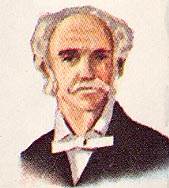 Thorburn,
Sir Robert (1836-1906),
Prime Minister of Newfoundland (1885-89), was born at Juniper Bank, Peebleshire,
Scotland, on March 28, 1836. In 1852 he came to Newfoundland and entered a
mercantile firm that was managed by his uncles, James and Walter
Grieve. In 1862 he became manager of a firm, and in 1887 formed his own
company. [He was active on the anti-confederate side in the elections
of 1869 and was, consequently,] appointed to the Legislative Council in
1870 [by Charles
Fox Bennett]. [In the 1880's he was one of the founders of the New Party
- essentially a conservative party protecting the interest of the Water
Street merchants; however, after the Harbour
Grace Affray (1883) where Catholics confronted a parade of Orange
lodge followers (with four deaths as a result) a realignment of New Party
members and protestant followers of Whiteway
brought the creation of a Reform Party with Thorburn as leader. His party
was successful in the election of 1885, and he became Prime Minister]. The
British government ratified the Bait
Act during his administration (1888) and the Placentia
railroad was built. His party was defeated in 1889, and in 1894 he was
reappointed to the Legislative Council. [He suffered considerable financial
losses in the Newfoundland
bank debacle of 1894.] He died on April 12, 1906. In 1865 he married Susanna
Janetta, daughter of Andrew Milroy of Hamilton, Ontario, and by her had three
sons and two daughters. He was created K.C.M.G. in 1887. [Railways
and fisheries, 1874-1889] [DCB]
[Can.
Ency] [The bank
crash of 1894]
Thorburn,
Sir Robert (1836-1906),
Prime Minister of Newfoundland (1885-89), was born at Juniper Bank, Peebleshire,
Scotland, on March 28, 1836. In 1852 he came to Newfoundland and entered a
mercantile firm that was managed by his uncles, James and Walter
Grieve. In 1862 he became manager of a firm, and in 1887 formed his own
company. [He was active on the anti-confederate side in the elections
of 1869 and was, consequently,] appointed to the Legislative Council in
1870 [by Charles
Fox Bennett]. [In the 1880's he was one of the founders of the New Party
- essentially a conservative party protecting the interest of the Water
Street merchants; however, after the Harbour
Grace Affray (1883) where Catholics confronted a parade of Orange
lodge followers (with four deaths as a result) a realignment of New Party
members and protestant followers of Whiteway
brought the creation of a Reform Party with Thorburn as leader. His party
was successful in the election of 1885, and he became Prime Minister]. The
British government ratified the Bait
Act during his administration (1888) and the Placentia
railroad was built. His party was defeated in 1889, and in 1894 he was
reappointed to the Legislative Council. [He suffered considerable financial
losses in the Newfoundland
bank debacle of 1894.] He died on April 12, 1906. In 1865 he married Susanna
Janetta, daughter of Andrew Milroy of Hamilton, Ontario, and by her had three
sons and two daughters. He was created K.C.M.G. in 1887. [Railways
and fisheries, 1874-1889] [DCB]
[Can.
Ency] [The bank
crash of 1894]
[Tobin, Brian (1954- ). Born in Stephenville, Newfoundland, he attended Memorial University. Upon graduation, he worked in radio broadcasting for a while. He was elected to the House of Commons as a Liberal in 1980. He sat in the House until 1996. He rose early to prominence when, along with Sheila Copps and John Nunziata, he was one of the most vocal critics of the Mulroney government, being part of a group known as the "Rat Pack". Upon the formation of the Chrétien government in 1993, Tobin was appointed Minister of Fisheries. He gained favour among Canadian nationalists by his involvement in the Quebec referendum campaign over sovereignty in 1995, and by his hard-nose position against a Spanish fishing trawler allegedly overfishing turbot in international waters on the edge of the Grand Banks of Newfoundland in the same year - this measure was strongly denounced by the Spanish and European authorities. For his strong action, Tobin was nicknamed "Captain Canada", a title he rather relished. Upon the resignation of Clyde Wells from the leadership of the Newfoundland Liberal party and premiership of the province, Tobin was acclaimed into both positions. He remained the Premier of Newfoundland from 1996 to 2000. He resigned the premiership in year 2000 and rejoined the Chrétien government as Minister of Industry. There was much speculation that he was jockeying for the job of Prime Minister of Canada as rumours were strong that Chrétien intended to leave politics. Regardless, Tobin left politics in 2002, amid speculation as to why he was stepping down.][Note on an address about the petroleum Industry of Newfoundland] [Can. Ency] [His resignation from politics] [Brian Tobin on the Churchill Falls development project] [Captain Canada bows out for now] [Newfoundland Provincial politics, 1972-2001]
Tocque, Philip (1814-1899), clergyman and author, was born at Carbonear, Newfoundland, in January, 1814. He became a school-teacher and later clerk of peace for southern Newfoundland, and still later embarked on the study of theology and in 1864 was ordained a priest in the Church of England. He occupied various charges in Nova Scotia, Massachusetts, Quebec, and Ontario, and died in Toronto on October 22, 1899. His publications include Wandering thoughts (London, 1846), Newfoundland, as it was and as it is (London, 1878), and Kaleidoscope echoes (Toronto, 1895). [Tocque is considered to be the first Newfoundlander of literary significance.] See W. S. Wallace, Dictionary of Canadian biography (Toronto, 1945). [DCB] [Comment on Tocque's scientific knowledge]
[Treworgie, John (1618-?). Proprietary governor of Newfoundland between 1653-1660. (Newfoundland heritage site)] [DCB]
[Vanbrugh, Philip (b. ?-1753). Naval governor of Newfoundland in 1738. (Newfoundland heritage site)]
Vaughan, William (1577-1641), poet and colonizer, bought an interest in Newfoundland in 1616. He sent out settlers (1617-18) to "Cambriol", at the head of Trepassey bay, under the command of Richard Whitbourne, and apparently lived in the colony himself from 1622 to 1625. On his return he published two works: (1) Cambrensium Caroleia, a Latin poem published under the pseudonym of Orpheus junior; the only known copy, which is in the British Museum, contains a map of Newfoundland by Capt. John Mason, and (2) The golden fleece, as allegory in praise of his colony. He published many other literary, religious, and medical works, including The Newlander cure (London, 1630), concerning the diseases most prevalent in Newfoundland. He died on August 14, 1641. [DCB] [William Vaughan and New Cambriol] [short biography] [Can. Ency]
[Waldegrave, William (1753-1825). Naval governor of Newfoundland from 1797 to 1799. (Newfoundland heritage site)] [DCB]
Wallace, Sir James (1731-1803), admiral, was governor of Newfoundland from 1794 to 1797. His squadron, except for his flagship, was composed of frigates and smaller vessels intended for the protection of trade against privateers, so that he was unable to offer serious resistance to the strong French squadron that carried out raids on the coast in 1796. [website]
Walwyn, Sir Humphrey Thomas (1879-1957), governor of Newfoundland (1936-46), was born on January 25, 1879, the second son of Colonel J. Walwyn. He went to sea in H.M.S. Camperdown in 1895, and served successively as gunnery lieutenant (1904), captain (1916), commander of destroyer flotillas and senior officer of Mediterranean destroyers (1923), director of the gunnery division of the admiralty naval staff (1924-26), and flag officer commanding the Royal Indian Navy (1928-34). From 1936 to 1946 he was governor of Newfoundland. He was created C.B. (1928), K.C.S.I. (1933), and K.C.M.G. (1939). In - 1912 he married Eileen Mary van Straubenzee, by whom he has one son. [website]
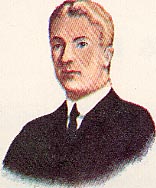 Warren, William Robertson (1879-1927), lawyer and politician, was
born in St.
John's, Newfoundland, on October 9, 1879, the son of William Henry Warren
and Jessie Harvey. He was educated at Bishop Feild College, St. John's, and
Framlingham College, England. He studied law, was admitted as a solicitor
in 1901, and in 1910 was appointed K.C. He was elected to the Newfoundland
House of Assembly first in 1908, for Port de Grave, and subsequently served
as Speaker (1909-13), Minister of Justice (1919-23), and Prime Minister (1923-24).
[He assumed the position of Prime Minister in the wake of the scandal that
brought the resignation of Richard
Squires. He had been the prime actor in bringing out the issue of corruption
in that government. However, in the confused political situation that emerged
from the war and from the charges laid against the Squires government, he
was unable to keep enough political support to continue governing the country.].
He was retained as counsel for Newfoundland in the Labrador
boundary dispute before the Privy
Council. He resigned from the House of Assembly in 1926 and was appointed
to the Supreme Court.] He died on December 31, 1927. He was twice married,
(1) to Ethel Alice Gordon, by whom he had one son and two daughters, and (2)
to Emilie Jackson, by whom he had one daughter. [Can.
Ency] [picture]
Warren, William Robertson (1879-1927), lawyer and politician, was
born in St.
John's, Newfoundland, on October 9, 1879, the son of William Henry Warren
and Jessie Harvey. He was educated at Bishop Feild College, St. John's, and
Framlingham College, England. He studied law, was admitted as a solicitor
in 1901, and in 1910 was appointed K.C. He was elected to the Newfoundland
House of Assembly first in 1908, for Port de Grave, and subsequently served
as Speaker (1909-13), Minister of Justice (1919-23), and Prime Minister (1923-24).
[He assumed the position of Prime Minister in the wake of the scandal that
brought the resignation of Richard
Squires. He had been the prime actor in bringing out the issue of corruption
in that government. However, in the confused political situation that emerged
from the war and from the charges laid against the Squires government, he
was unable to keep enough political support to continue governing the country.].
He was retained as counsel for Newfoundland in the Labrador
boundary dispute before the Privy
Council. He resigned from the House of Assembly in 1926 and was appointed
to the Supreme Court.] He died on December 31, 1927. He was twice married,
(1) to Ethel Alice Gordon, by whom he had one son and two daughters, and (2)
to Emilie Jackson, by whom he had one daughter. [Can.
Ency] [picture]
Watson, Charles (1714-1757), naval commander-in-chief on the Newfoundland and North American station (1747-48), was son of Dr. John Watson, prebendery of Westminster. He entered the navy in 1728, received rapid promotion, and in 1748 attained the rank of Rear-Admiral. As Commander-in-chief in the East Indies (1754-57) he co-operated with Clive in several military operations. He died in Bengal in 1757. [website] [DCB]
Watson, Robert (1868-1931), acting Prime Minister of Newfoundland (1910), was born at Hant's Harbour, Newfoundland, on September 1, 1868, son of E. R. Watson. He was educated in St. John's and at Rugby. He was elected to the House of Assembly for Trinity in 1897, 1902, 1908, and 1909 [but defeated in 1902]. In 1909 he became a member of the executive council, and during the absence of Sir Edward Morris, in 1910, acted as [Prime Minister]. He was director of several organizations interested in welfare and education, and in 1913 became manager of the Newfoundland Savings Bank. In 1916 he was appointed private secretary to the governor, Sir Walter Davidson, and thereafter was attached to the staffs of succeeding governors. He died at Government House, St. John's, on May 4, 1931. In 1891 he married Dora Melville Pye, who died in 1893.
Waunathoake.See March, Mary.
Webb, James (d. 1761), governor of Newfoundland (1760-61), had distinguished himself by capturing a large number of French privateers between 1746 and 1748. He died on May 14, 1761, on board the Antelope, which was then prepared to sail for Newfoundland. [website] [DCB]
Wells, Clyde Kirby (1937- ). Born in Buchans Junction, he pursued legal studies at Dalhousie University and was admitted to the Bar in 1964. He sat in the Newfoundland House of Assembly from 1966-1971 and again from 1989 to1996. He was appointed to the cabinet by Joey Smallwood in 1966 but left in disagreement with Smallwood over government guarantees extended to the Come by Chance oil refinery. He returned to the practice of law in 1971. In 1987, he was elected leader of the provincial Liberal Party and, in 1989, following an electoral victory that put an end to 17 years of Conservative rule, he became Premier of Newfoundland, although he suffered a personal defeat in his own riding. One of his first decisions was to throw out Newfoundland's assent to the Meech Lake Accord. He claimed that Meech put too much emphasis on Quebec and did not consider sufficiently its impact on the other provinces. He alleged the Accord gave more power to the wealthier provinces, at the expense of the poorer ones, and that the restriction on the federal spending power would hamper its capacity to create national programs and, consequently, impact negatively on Newfoundland. His arguments were well received by many Canadians outside of Quebec and, for a time, he was the "darling" of the liberal-centralist set in Canada. His administration saw the collapse of the Newfoundland cod fishery and the establishment of a cod moratorium. He supported the idea of a Triple-E senate and opposed the Social Union. He resigned his post as premier in early 1996. Throughout his political career, he was variously seen as morally upstanding, inflexible, honest, righteous and sanctimonious.[Can. Ency] [Newfoundland provincial politics, 1972-2001]
[Whelan, Stella Maris (Meany) (1910-1998). Civil servant; stenographer with the National Convention to decide the future of Newfoundland. (Archival treasures of Memorial University)] [History of the Newfoundland National Convention]
Whitbourne, Sir Richard (fl. 1579-1628), adventurer, [colonizer] and author, made his first voyage to Newfoundland about 1579, and in 1583 witnessed the ceremony in which Sir Humphrey Gilbert claimed the island for England. In 1588 he equipped a ship to serve against the Spanish armada, and commanded her himself. In 1615, on one of his voyages to Newfoundland, he carried a commission from the Court of Admiralty to hold courts in the country, and carried out his commission energetically, but wrote later that his report had been "overslipt" by the Admiralty. In 1617 he transported the colonists of William Vaughan, and in 1618 made a second voyage for Vaughan [as he had chosen Whitbourne to govern his colony at Renews. Two years later, he applied to the Privy Council to be permitted to establish a colony in Newfoundland. In 1622, he supported Henry Cary (Lord Falkland) in his attempt to establish a colony at Renews. He his last known to have come to Newfoundland in 1626.] In 1620, in London, he published his Discourse and discovery of New-found-land, with many reasons to groove how worthy and beneficiall a plantation may there be made; after a far better manner than it now is. Together with the laying open of certaine enormities and abuses committed by some that trade to that countrey, and the meanes laid doune for reformation thereof. His discourse excited much interest and sympathy, and was followed by his being knighted. He enlarged the discourse in an edition of 1622, and versions have been published in German and Latin translation. An English abstract, containing the autobiographical notes, was edited by T. Whitburn in 1870. [Whitbourne wrote three books about Newfoundland. In his writings, he provided much information about the geography, the resources, the climate and the potential of Newfoundland. He was an ardent promoter of the colonization of the island.] [DCB] [biography at the Newfoundland Heritage Site]
White, Arthur Ernest (1870-1913), physician and editor, was the youngest son of Dr. Robert and Caroline White of Trinity, Newfoundland. He studied medicine in New York and Philadelphia, and afterwards took over his father's practice in Trinity. For several years he edited Trinity Enterprise. He died on May 10, 1913.
White, WilliamCharles (1865-1943), Anglican bishop of Newfoundland (1918-42), was born at Trinity, Newfoundland on August 31, 1865, the son of Dr. Robert White. He was educated at the Church of England Academy, St. John's, and St. Augustine's College, Canterbury. He served as deacon (1888), vicar of Fogo (1890-1900), rector of Heart's Content (1900-08), rector of the cathedral parish (1908-17), and afterwards as bishop. [He opposed the suggestion made by some members of the Commission of government to do away with denominational education in Newfoundland.] He died on June 14, 1943.
Whiteley, William (1834-1903), inventor of the cod trap, was born in Boston on June 5, 1834. While still a boy he was apprenticed to a printer, but about 1849 he left the shop, on account of his poor health, and went to Labrador, where for many years he acted as agent for a supplying merchant at Bonne Esperance. He set a record by taking, with a crew of six men, 1,080 quintals of codfish within thirty-nine days, and in 1871 he invented the cod-trap. He moved from Bonne Esperance to St. John's in 1881 and was elected [for one term] to the [House of Assembly] for Harbour Grace in 1889. He married Miss L. A. Thompson, of London. [DCB] [The development of the cod-trap] [picture of a cod-trap in the water]
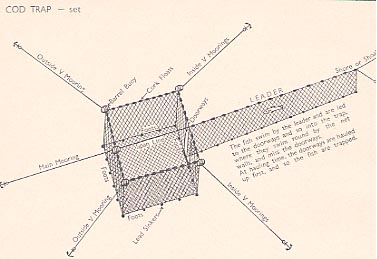
Whiteley's cod trap
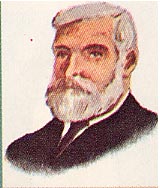 Whiteway, Sir William Vallance
(1828-1908), Prime Minister of Newfoundland (1878-85, 1889-94, 1895-97), was
born at Buckyett, Devonshire, on April 1, 1828, and came to Newfoundland in
1843. He worked in the law office of his uncle, Mr. [R. R.] Wakeham, was admitted
to the bar in 1852 and was appointed Q. C. in 1862. He entered the House of
Assembly in 1859 as member for Twillingate
and Fogo,
and from 1865 to 1869 was Speaker of the House. [He supported Confederation
in 1869 and, consequently, suffered defeat at the general
elections held the same year.] He distinguished himself as counsel for
Newfoundland at meetings of the fisheries commission in Halifax, 1877. [At
that conference, he was able to convince others that Newfoundland should receive
compensation of $1,000,000 for the fisheries' concessions that had been made
to the United States in the Treaty
of Washington, 1871]. In 1873 he was returned for the district of Trinity
and in 1878 became [Prime Minister, primarily with Protestant and Conservative
support. The policy of his government centered on the construction of a transinsular
railway and on seeking ways to finance it. He lost the support of some
of the business community by his boldness, afraid, as they were, that he was
shifting emphasis from the fisheries and that he was bankrupting the country.
By 1882, overtures were made to Ambrose
Shea and some Catholics supported his coalition in the elections of the
same year. This allowed him to continue in power until the Harbour
Grace Affray so strained relations between Catholics and Protestants in
Newfoundland that his government collapsed by 1885]. He retired temporarily
in 1885, but in 1889 returned to the leadership of the Liberals and was [Prime
Minister] until 1897, except for a brief interval, [in 1894-1895,] following
investigation of corrupt practices in his government. [In 1895, the Whiteway
government conducted a new round of negotiations to effect union
of Newfoundland with Canada; these took place in a context of increased
financial difficulties for the government of Newfoundland and the Newfoundland
bank crash of 1894]. He was responsible for development
of railroads during his administrations. [Railway construction now laid
in the hands of Robert G. Reid, whose company, Reid
Newfoundland, emerged as a business giant in Newfoundland. In Newfoundland
history, the name of Whiteway is strongly associated with "progress" - "Progress
versus Stagnation and Starvation" was his slogan in the elections of 1882.
The railway, economic diversification and the settlement of the French
Shore issue were the cornerstones of his administrations.] He died in
St.
John's in 1908. He was created a K.C.M.G. (1880), a privy
councillor (1897), and was made a D.C.L. of Oxford
University (1897). He was twice married; (1) in 1862 to Mary (d. 1868),
daughter of the Rev: J. Lightbourne, and (2) in 1872 to Catherine Anne, daughter
of W. H. Davies. [Remembering
the life of a Newfoundland Prime Minister] [Events surrounding the charges
and court trials for political corruption of various members of the Whiteway
government in 1894] [DCB]
[Biography
at the Canadian Orangeism site] [Can.
Ency] [picture]
Whiteway, Sir William Vallance
(1828-1908), Prime Minister of Newfoundland (1878-85, 1889-94, 1895-97), was
born at Buckyett, Devonshire, on April 1, 1828, and came to Newfoundland in
1843. He worked in the law office of his uncle, Mr. [R. R.] Wakeham, was admitted
to the bar in 1852 and was appointed Q. C. in 1862. He entered the House of
Assembly in 1859 as member for Twillingate
and Fogo,
and from 1865 to 1869 was Speaker of the House. [He supported Confederation
in 1869 and, consequently, suffered defeat at the general
elections held the same year.] He distinguished himself as counsel for
Newfoundland at meetings of the fisheries commission in Halifax, 1877. [At
that conference, he was able to convince others that Newfoundland should receive
compensation of $1,000,000 for the fisheries' concessions that had been made
to the United States in the Treaty
of Washington, 1871]. In 1873 he was returned for the district of Trinity
and in 1878 became [Prime Minister, primarily with Protestant and Conservative
support. The policy of his government centered on the construction of a transinsular
railway and on seeking ways to finance it. He lost the support of some
of the business community by his boldness, afraid, as they were, that he was
shifting emphasis from the fisheries and that he was bankrupting the country.
By 1882, overtures were made to Ambrose
Shea and some Catholics supported his coalition in the elections of the
same year. This allowed him to continue in power until the Harbour
Grace Affray so strained relations between Catholics and Protestants in
Newfoundland that his government collapsed by 1885]. He retired temporarily
in 1885, but in 1889 returned to the leadership of the Liberals and was [Prime
Minister] until 1897, except for a brief interval, [in 1894-1895,] following
investigation of corrupt practices in his government. [In 1895, the Whiteway
government conducted a new round of negotiations to effect union
of Newfoundland with Canada; these took place in a context of increased
financial difficulties for the government of Newfoundland and the Newfoundland
bank crash of 1894]. He was responsible for development
of railroads during his administrations. [Railway construction now laid
in the hands of Robert G. Reid, whose company, Reid
Newfoundland, emerged as a business giant in Newfoundland. In Newfoundland
history, the name of Whiteway is strongly associated with "progress" - "Progress
versus Stagnation and Starvation" was his slogan in the elections of 1882.
The railway, economic diversification and the settlement of the French
Shore issue were the cornerstones of his administrations.] He died in
St.
John's in 1908. He was created a K.C.M.G. (1880), a privy
councillor (1897), and was made a D.C.L. of Oxford
University (1897). He was twice married; (1) in 1862 to Mary (d. 1868),
daughter of the Rev: J. Lightbourne, and (2) in 1872 to Catherine Anne, daughter
of W. H. Davies. [Remembering
the life of a Newfoundland Prime Minister] [Events surrounding the charges
and court trials for political corruption of various members of the Whiteway
government in 1894] [DCB]
[Biography
at the Canadian Orangeism site] [Can.
Ency] [picture]
[Williams, Danny (1950- ). Born in St. John's, he was educated at Memorial University and at Dalhousie; he was awarded a Rhodes scholarship and read law at Oxford University.Aside from his legal activities, he became involved, upon graduation, in business, setting up an important cable-television company (Cable Atlantic) and investing in oil and gas exploration (OIS Fisher). A self-made millionaire, he entered into politics in 2001, being elected to the Newfoundland House of Assembly and becoming the leader of the Progressive-Conservative Party of Newfoundland. At the general elections of 2003, his party was victorious and he became the Premier of Newfoundland.] [Official biography] [CTV's biography of Williams]
Williams, Sir Ralph Champneys (1848-1927), explorer and colonial governor, was born in Ungland on March 9, 1848. He carried on explorations in Patagonia (1873-74) and Africa (1883-85), and afterwards held administrative posts in various parts of the empire: He was governor of Newfoundland from 1909 to 1913. His publications include How I became a governor (1913). He was created C.M.G. in 1901, and K.C.M.G. in 1907. He died on June 22, 1927. In 1875 he married Jessie (d. 1917), youngest daughter of Samuel Dean, and by her had one son. [website]
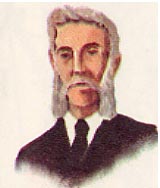 Winter, Sir James Spearman (1845-1911), lawyer and politician, was
born in Lamaline, Newfoundland, on January 1, 1845, the eldest son of James
Winter. He was educated in St.
John's, and at the age of sixteen articled as a law student in the office
of Sir Hugh Hoyles.
He was called to the bar in 1867 (Q.C., 1880). He was elected to the Newfoundland
House of Assembly for Burin
(1877) [as a Conservative supporter of F.
B. T. Carter], and was nominated Speaker, [a position he occupied from
1877-1879]. He served as Solicitor-general (1882-85) [in the Whiteway
administration], Attorney-general (1885-89) [in the Thorburn
government], and assistant judge in the Supreme court (1893-96). In 1896 he
re-entered politics and was [Prime Minister] of Newfoundland (1897-1900) during
a period of disputes
over railway contracts. [Robert
Bond, leader of the Opposition, claimed that Winter had sold-out Newfoundland
interest to the Reid
family. Winter's Minister of Finance, A. B. Morine, was actually on the
payroll of Reid, as legal council, while the contract was being negotiated
by Winter and Morine]. He represented Newfoundland at the fisheries conference
in Washington (1887-88) and was senior counsel for the British government
before the arbitration tribunal at the Hague in 1910. He died on October 6,
1911, in Toronto. He was created a K.C.M.G. in 1888. He married Emily, daughter
of Capt. W. J. Coen, and by her had four sons and four daughters. [DCB]
[Biography at
the Canadian Orangeism site] [Can.
Ency]
Winter, Sir James Spearman (1845-1911), lawyer and politician, was
born in Lamaline, Newfoundland, on January 1, 1845, the eldest son of James
Winter. He was educated in St.
John's, and at the age of sixteen articled as a law student in the office
of Sir Hugh Hoyles.
He was called to the bar in 1867 (Q.C., 1880). He was elected to the Newfoundland
House of Assembly for Burin
(1877) [as a Conservative supporter of F.
B. T. Carter], and was nominated Speaker, [a position he occupied from
1877-1879]. He served as Solicitor-general (1882-85) [in the Whiteway
administration], Attorney-general (1885-89) [in the Thorburn
government], and assistant judge in the Supreme court (1893-96). In 1896 he
re-entered politics and was [Prime Minister] of Newfoundland (1897-1900) during
a period of disputes
over railway contracts. [Robert
Bond, leader of the Opposition, claimed that Winter had sold-out Newfoundland
interest to the Reid
family. Winter's Minister of Finance, A. B. Morine, was actually on the
payroll of Reid, as legal council, while the contract was being negotiated
by Winter and Morine]. He represented Newfoundland at the fisheries conference
in Washington (1887-88) and was senior counsel for the British government
before the arbitration tribunal at the Hague in 1910. He died on October 6,
1911, in Toronto. He was created a K.C.M.G. in 1888. He married Emily, daughter
of Capt. W. J. Coen, and by her had four sons and four daughters. [DCB]
[Biography at
the Canadian Orangeism site] [Can.
Ency]
Winter, Sir Marmaduke George (1857-1936), industrialist and politician, was born at Lamaline, Newfoundland, on April 4, 1857, the son of James Winter. He was educated at the Church of England Academy, St. John's, and Upper Canada College, Toronto. In partnership with his brother Thomas, he established a wholesale business in St. John's [the T. and M. Winter Co.], and subsequently acquired interests in many industrial and commercial enterprises. In 1910 he was appointed to the Legislative Council. He was created C.B.E. (1919) and knight bachelor (1923). He died on August 11, 1936, in St. John's. He was married twice, (1) in 1883 to Alice Augusta, (d. 1924), daughter of Robert W. W. Lilly, K.C., of St. John's, by whom he had two sons and two daughters, and (2) to the widow of Mr. Harrison Hayward,
Winter of the Rals, the name given in Newfoundland to the winter of 1817-18. It was a season of famine, extreme cold, and destructive fires, and rioters (rals) in various parts of the island seized ships and broke into stores of provisions.
Winton, Henry [1817-1866], editor of the Newfoundland PublicLedger, became conspicuous by his denunciation of interference by the clergy in Newfoundland elections, especially in connection with the election of John Kent, in 1832. [He believed that it was dangerous to have granted the right to vote to Catholics as they were unable to maintain an independent opinion in the face of clerical intervention in public affairs.] In May, 1835, he was waylaid by a gang of ruffians who cut off his ears. [DCB] [Bishop Fleming and the Roman Catholic Church]
Wix, Edward (1802-1866), second archdeacon of the Anglican Church in Newfoundland, was appointed in 1830 and served until the arrival of Aubrey Spencer, the first bishop, in 1839. He published, besides several sermons, six months of a Newfoundland missionary's journal (St. John's, 1836). [Can. Ency] [Sermon on the Guilt of the Denial of God's Providence] [Six months of a missionary's Journal, 1835] [DCB]
[Wood, Thomas Martin (1807-1881). First Church of England minister ordained in Newfoundland. (Archival treasures of Memorial University)]
[Wynne, Edward (dates unknown) Proprietary governor of the Avalon colony between 1621-1625. (Newfoundland heritage site)] [DCB]
Source: For material that is not between brackets [.], W. Stewart WALLACE, ed., The Encyclopedia of Canada. Newfoundland Supplement, Toronto, University Associates of Canada, 1949, 104p. Weblinks have been added to the text.
© 2004 Claude Bélanger, Marianopolis College |